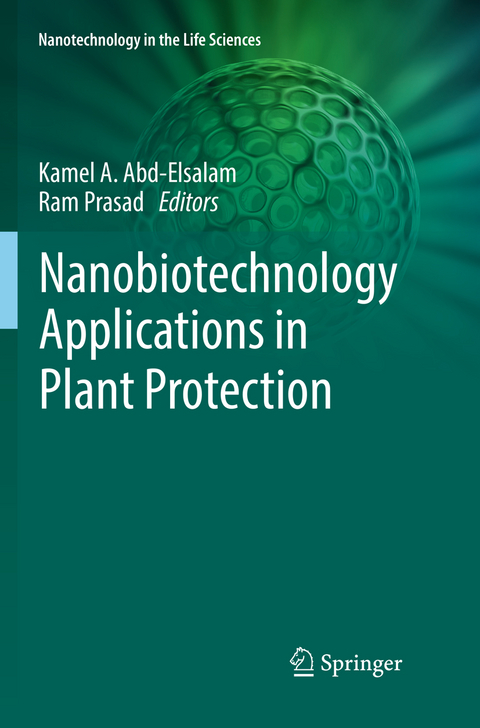
Nanobiotechnology Applications in Plant Protection
Springer International Publishing (Verlag)
978-3-030-08189-8 (ISBN)
Novel nanobiotechnology methods describe new plant gene transfer tools that improve crop resistance against plant diseases and increase food security. Also, quantum dots (QDs) have emerged as essential tools for fast and accurate detection of particular biological markers. Biosensors, QDs, nanostructured platforms, nanoimaging, and nanopore DNA sequencing tools have the potential to raise sensitivity, specificity, and speed in pathogen detection, thereby facilitating high-throughput analysis and providing high-quality monitoring and crop protection. Also, this book deals with the application of nanotechnology for quicker, more cost-effective, and precise diagnostic procedures of plant diseases and mycotoxins. Applications of nanotechnology in plant pests and disease control, antimicrobial mechanisms, pesticides remediation and nanotoxicity on plant ecosystem and soil microbial communities are discussed in detail. Moreover, the application of specific nanomaterials including silver, copper, carbon- or polymer-based nanomaterials and nanoemulsions are also discussed. Crops treated with safe nanofertilizers and nanopesticides will gain added value because they are free of chemical residues, decay and putative pathogens for human health, sustaining the global demand for high product quality.
Kamel Abd-Elsalam, Ph.D. is a head researcher at Plant Pathology Research Institute, Agricultural Research Center, Giza, Egypt. Dr. Kamel's research interests include developing, improving and deploying plant biosecurity diagnostic tools, understanding and exploiting fungal pathogen genomes and developing eco-friendly hybrid nanomaterials for controlling toxicogenic fungi and plant diseases. He has published, 8 book chapters, 6 review articles, 1 translated book, and more than 120 research articles in international peer reviewed journals including Fungal Diversity, Fungal Biology, FEMS Review Microbiology, PLOS One and PLOS Genetics. He is associate editor for Mycosphere, and review editor for Frontiers in Genomic Assay Technology and referees for journals, including the Plant Pathology, Journal of Phytopathology, and Crop Protection, IET Nanotechnology, Fungal Diversity, BMC Genomics, Foodborne Pathogens and Diseases. Dr. Kamel has also served as molecular mycologist for 5 years in the Department Botany and Microbiology Department, College of Science, King Saud University, Saudi Arabia. He received the Federation of Arab Scientific Research Councils Prize for distinguished scientific research in biotechnology (fungal genomics) during 2014 (first ranking). Dr. Kamel has pursued his Ph.D. in Molecular Plant Pathology from Christian Alberchts University of Kiel (Germany) and Suez Canal University (Egypt) and then been awarded postdoctoral fellowship from Christian Alberchts University of Kiel in 2008. Dr. Kamel served as visiting associate professor in Institute of Excellence in Fungal Research, Mae Fah Luang University, Thailand, Institute of Microbiology, TUM, Germany, Laboratory of Phytopathology, Wageningen University, The Netherlands and Plant Protection Department, Sassari University, Italy. Ram Prasad, Ph.D. is assistant professor at the Amity Institute of Microbial Technology, Amity University, Uttar Pradesh, India. His research interest includes plant-microbe interactions, sustainable agriculture, and microbial nanobiotechnology. Dr. Prasad has more than a hundred publications to his credit, including research papers and book chapters and fie patents issued or pending, and edited or authored several books. Dr. Prasad has 11 years of teaching experience, and he has been awarded the Young Scientist Award (2007) and Prof. J. S. Datta Munshi Gold Medal (2009) by the International Society for Ecological Communications, the FSAB fellowship (2010) by the Society for Applied Biotechnology, the Outstanding Scientist Award (2015) in the field of microbiology by Venus International Foundation, and the American Cancer Society UICC International Fellowship for Beginning Investigators (USA, 2014). In 2014-2015, Dr. Prasad served as visiting assistant professor in the Department of Mechanical Engineering at Johns Hopkins University, USA.
Preface.- 1. Nanotechnology and their applications in insects pest control.- 2. Cytotoxic potential of plant nanoparticles.- 3. Nanoparticle based plant disease management: Tools for sustainable agriculture.- 4. Vital implication of nanotechnology in plant protection.- 5. PCR Amplification yield enhancement of fungal DNA templates extracted via three types of nanoparticles.- 6. Potential of Nanofabrication for Environment Management.- 7. Nano biotechnology in Plant Pathology.- 8. Recent advancement in Nanofungicides.- 9. Nanotechnology and pesticides: Current state, Prospects, and constraints.- 10. Role of microbes in plant protection using intersection of nanotechnology and biology.- 11. Interaction of nanoparticles with plant cell.- 12. Antifungal activity of three types of Nano agrochemicals against Alternaria alternate, Rhizoctonia solani and Botrytis cinerea.- 13. The role of nanostrucutres in plant protection.- 14. Application of Silver nanoparticles in Plant disease control.- 15. Nanotechnology in agricultural diseases and Food safety.- 16. Application of nanotechnology in detection of mycotoxins.- Index.
| Erscheint lt. Verlag | 8.1.2019 |
|---|---|
| Reihe/Serie | Nanotechnology in the Life Sciences |
| Zusatzinfo | XII, 394 p. 48 illus., 44 illus. in color. |
| Verlagsort | Cham |
| Sprache | englisch |
| Maße | 155 x 235 mm |
| Gewicht | 837 g |
| Themenwelt | Naturwissenschaften ► Biologie ► Botanik |
| Schlagworte | Biological Control • Biotechnology • crop protection • Entomology • Integrated Pest Management • Nano-agriculture • nanotechnology • Phytopathogens • Plant disease • plant pathology |
| ISBN-10 | 3-030-08189-3 / 3030081893 |
| ISBN-13 | 978-3-030-08189-8 / 9783030081898 |
| Zustand | Neuware |
| Haben Sie eine Frage zum Produkt? |
aus dem Bereich


